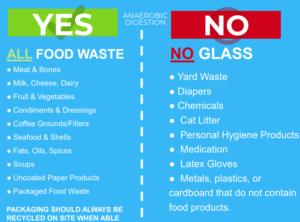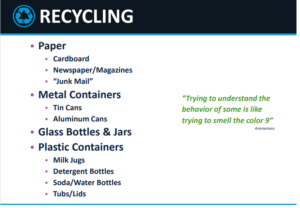The timing was perfect — a new waste ban for textiles in Massachusetts, a bombshell Greenpeace study casting doubt on plastics recycling, and an engaged audience anxious to get their questions answered. The Nov. 2, 2022 Needham Solid Waste Forum, cosponsored by the Needham RTS and Green Needham, gave a comprehensive view of opportunities and challenges in moving towards zero waste.
Presentations covered everything from the State’s long range waste reduction plan to updates on the operation of the Needham RTS and information about the recycling process. (Yes, appropriate plastics brought to the RTS do get recycled. Read more below.)
Solid waste challenges are daunting. Greg Cooper, Director at the Mass. Dept. of Environmental Protection, pointed out that each year a mind–boggling 5.7 million tons of waste is generated in Massachusetts. That’s over 1,600 pounds of waste per person. Of this, 3 million tons are incinerated at waste-to-energy facilities, 2.2 million tons are exported to other states, and the rest is disposed of at the 5 active landfills in Massachusetts, 4 of which will close by 2030. The State’s 2020-2030 Solid Waste Master Plan calls for a 30% reduction of solid waste by 2030, to 4 million tons/year, on the way to a 90% reduction by 2050.
The good news is that all of us can be a part of the solution by using our creativity and commitment to make lifestyle/consumption changes that contribute to waste reduction. Recycling right is clearly part of the solution, but even more important is reducing waste in the first place — donating items, avoiding food waste, drastically reducing purchase of single use items or clothing that is not made to last.

What’s new?
Food waste collection: State-wide, food waste accounts for a whopping 26% of trash. Greg Williams from Agri-Cycle was on hand to talk about the food scrap collection at the RTS and at several Needham schools. The food waste is brought to an anaerobic digester in Exeter, Maine that mixes the food scraps with animal waste to make electricity for 3000 homes, with the byproducts used as fertilizer and animal bedding. Nothing goes to the landfill. He emphasized that using, rather than wasting, the food we buy and having businesses give safe, unsold food to feed the hungry are the first priorities. See details here about the food scrap drop-off at the RTS.
Textile Ban: As of Nov. 1, 2022, textiles are not allowed to be thrown in the trash. This includes clothing, shoes, belts, and textiles such as curtains, linens, and bedding, all of which can be donated instead. Clothes and shoes that are worn or torn, but not moldy or contaminated with toxic substances, are acceptable. Wearable items are donated or sold in stores; the rest are sold in bulk to make products such as industrial rags and insulation. Matt DeMarrais, the evening’s moderator and Needham’s Acting Superintendent of Recycling and Solid Waste, pointed out that there are 4 textile collection bins at the RTS, all frequently emptied. For disposal of mattresses (drop-off for $20 each) the Town partners with UTEC, a program in Lawrence that works with young adults to teach them the skills of mattress recycling.

Plastic recycling bombshell study: A recently released study by Greenpeace has gotten wide news coverage. The study details the enormous environmental cost of the proliferation of plastic and calls plastic recycling a “dead end,” saying that many plastics that consumers put in recycling bins do not actually get recycled. Paul Degnan, General Manager of Casella Recycling’s Auburn facility, where Needham sends its recycling, carefully went over what happens to the recyclables we send. While acknowledging the problem with proliferation of plastics and the need to reduce, he detailed how plastic containers brought to the RTS are sorted, processed and sent out domestically to make new products. Markets for No. 1 (PET) and No. 2 (HDPE) plastics are the strongest, while markets for Nos. 3-7 fluctuate, with No. 5 (PP) being the most stable. Of course, many plastic products are ineligible for single stream recycling, such as black plastic (cannot be “read” by sorting machines), plastic packaging like CD cases, Styrofoam, plant-based food containers marked “compostable,” and plastic bags (take to grocery store instead). See user-friendly RecycleSmartMA for detailed information about what’s recyclable and what’s not.
The evening ended as Degnan emphasized that recycling is important but “reduce and reuse” is at the top of the waste reduction hierarchy.
Buy less, use less, don’t waste — and recycle the rest. Keep an eye out for more information from Green Needham about opportunities and tips on reducing, reusing, and recycling.
Watch the Needham Channel’s video recording of the 11/2/2022 Recycling & Solid Waste Forum.
Or watch the individual presentations:
- Needham DPW’s Presentation
- MassDEP’s Presentation
- Needham Public School’s Presentation
- Casella’s Presentation
- Agri-Cycle’s Presentation
- Green Needham’s Presentation
Want to become more active? Join Green Needham’s Plastic Waste Reduction Team or help update Green Needham’s Recyclopedia.

